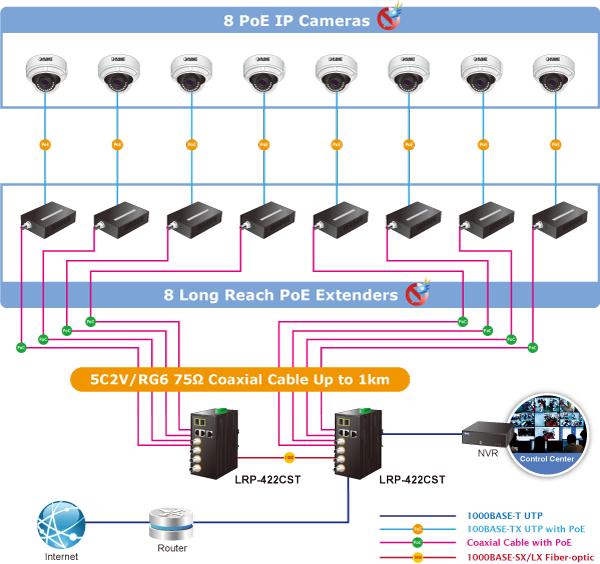The Key Benefits of Using CCTV Fibre Optic Cable for Reliable Surveillance
The Key Benefits of Using CCTV Fibre Optic Cable for Reliable Surveillance
Blog Article
Top Reasons to Pick CCTV Cameras With Fiber Optic Outcome for Reliable Security
In the evolving landscape of security modern technology, the selection of CCTV electronic cameras with fiber optic outcome presents an engaging case for reliability and effectiveness. As the need for high-grade surveillance continues to climb, understanding the cost-effectiveness and flexibility of these installations ends up being extremely important.
Superior Picture High Quality

This boosted picture quality is specifically crucial in settings needing meticulous monitoring, such as financial institutions, airports, and vital facilities. The high data transfer of fiber optic innovation supports advanced attributes like high-definition video and dynamic range, permitting for better presence in low-light problems.

Extended Transmission Range
Among the considerable benefits of CCTV cameras with fiber optic output is their capacity for prolonged transmission range. Unlike standard copper cable television systems, which are restricted by signal destruction over fars away, fiber optic technology permits the transmission of high-grade video clip signals over several kilometers without loss of high quality. This capacity is particularly helpful for huge centers, schools, or city environments where security coverage is important.
Making use of optical fiber in CCTV systems makes it possible for smooth assimilation throughout substantial locations, promoting the release of electronic cameras in remote areas that would otherwise be challenging to link. This extensive transmission range is not only advantageous for scalability but additionally for the adaptability in system layout. Installers can strategically position cams to enhance protection, making certain that critical areas are checked successfully.
Furthermore, the capacity to cover cross countries without the need for repeaters or extra equipment decreases general setup complexity and prices. fence detection system. Therefore, businesses and organizations can implement robust monitoring options that keep high efficiency over huge areas, enhancing protection procedures and operational efficiency. In recap, the extensive transmission range given by fiber optic output stands as a compelling reason to pick these advanced CCTV systems for trusted monitoring
Boosted Disturbance Resistance
The innovative modern technology of fiber optic output not just helps with prolonged transmission distances yet also uses enhanced disturbance resistance. Fiber optic cable televisions transmit data as light signals with glass or plastic fibers, making them inherently immune to electromagnetic disturbance (EMI) and superhigh frequency disturbance (RFI) This characteristic is specifically helpful in environments where digital devices might produce noise, such as industrial setups or largely booming urban locations.
Unlike conventional copper cable televisions, which can serve as antennas and get unwanted signals that break down video clip top quality, optical fiber preserve signal stability over cross countries. This guarantees that the security video captured continues to be clear and reputable, despite outside electro-magnetic disruptions. In addition, fiber optic cable televisions are much less prone to indicate loss as a result of depletion, permitting top notch video transmission even in challenging conditions.
Moreover, the use of optical fiber adds to general system protection, cctv fiber as the signals can not be quickly touched or disrupted, decreasing the risk of unapproved accessibility. By investing in CCTV cams with fiber optic outcome, individuals can delight in superior performance and satisfaction, understanding that their surveillance system is durable versus disturbance and capable of providing constant, high-grade video footage.
Cost-Effectiveness Gradually
Over time, the cost-effectiveness of CCTV electronic cameras with fiber optic result becomes progressively evident. While the preliminary financial investment may be greater than standard copper-based systems, the lasting economic advantages significantly offset this difference. Fiber optic technology uses higher longevity and reduced upkeep prices, resulting in less replacements and repair work over the lifespan of the electronic cameras.
Among the substantial cost-saving aspects is the minimized threat of signal degradation over lengthy distances. Fiber optics maintain premium video transmission, which decreases the demand for signal boosters and additional tools that can drive up overall costs. In addition, the durability of fiber cables against ecological conditions means they are much less likely to suffer damage from weather condition, pests, or electro-magnetic disturbance, translating to lower substitute prices.
Additionally, the energy effectiveness of fiber optic systems adds to decreased functional expenses. These video cameras generally require much less power to run contrasted to traditional systems, hence decreasing electricity bills gradually. When integrated with the potential for better protection results, the total return on financial investment for CCTV video cameras with fiber optic outcome clearly shows their affordable advantages in trusted security options.
Versatile Setup Choices
With a range of functional installment alternatives, CCTV electronic cameras equipped with fiber optic outcome can be seamlessly incorporated into numerous environments. Their lightweight design and versatility in mounting setups enable installations in both interior click to read and outside setups, adjusting to the particular requirements of any surveillance task.
From industrial buildings to suburbs, fiber optic CCTV systems can be strategically put to take full advantage of coverage while lessening unseen areas. The capability to set up these electronic cameras at differing heights and angles enhances their efficiency in monitoring essential areas. Additionally, the long-distance transmission capacities of optical fiber decrease the demand for repeaters, therefore streamlining installment in expansive areas.
In addition, these cams can be incorporated with existing framework, such as posts or building facades, which offers a cost-effective solution for updating security systems without comprehensive restorations. Their resilience to environmental aspects additionally makes fiber optic video cameras appropriate for testing locations, consisting of commercial websites or locations with high electromagnetic disturbance.
Final Thought

Report this page